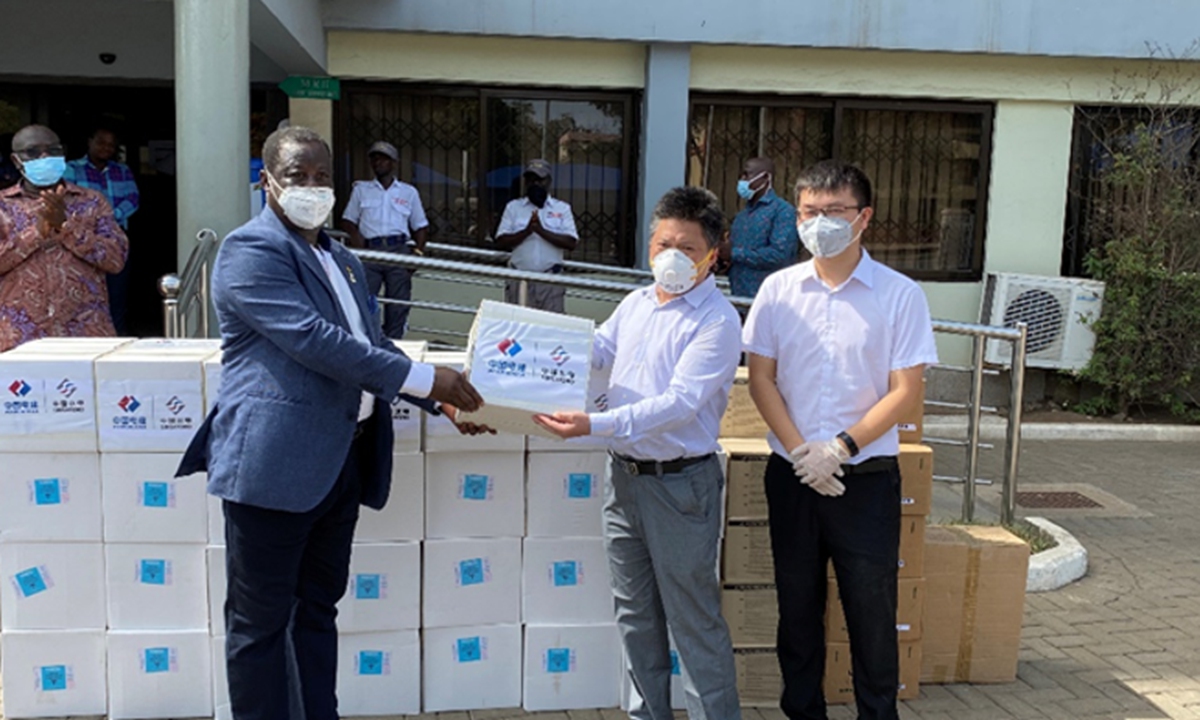Chinese companies pioneer Africa’s economic reboot
By Chu Daye and Wang Bozun Source:Global Times Published: 2020/6/17 21:58:40

Sinohydro's chief representative in Ghana, Huang Guanghui (center) presents donated medical supplies to a Ghanian official in March. Photo: Courtesy of Sinohydro
From donating personal prevention equipment to training locals in pandemic prevention knowledge, Chinese companies have been helping African countries combat COVID-19 spread while assisting them to revive economies, representatives from the companies told the Global Times.
As Africa faces the onslaught of the pandemic, Chinese companies said it is their responsibility to help local people fight the disease, and they vowed to keep enhancing cooperation between China and African countries.
The comments were made as a key meeting between leaders from China and Africa is being held with a focus on fighting the coronavirus in Africa.
To prevent their economies from a meltdown, African countries are slowly beginning to resume work and production.
As of Monday, more than 242,000 COVID-19 cases were confirmed in Africa. Although the figure is relatively low compared with other continents, there are only five ICU beds available per million African people - according to the WHO.
"China is the most capable among major economies to help Africa in its bid to reopen economy," said Liu Haifang, an African studies expert with Peking University.
Chinese experts said Chinese companies based in Africa are assisting the continent's economic reboot with their efficient organization, ready-made response plans and expertise in fighting the virus.
According to official data, China had been Africa's biggest trade partner for the past 10 years, and more than 3,700 Chinese companies were operating Africa as of the end of 2018.
In West Africa's Ghana, Chinese state-owned Sinohydro helped build a hydropower dam in north Ghana and explore a railway project near the country's capital Accra. It has donated medical goods including masks and protective suits worth $150,000 to the local government, the company's chief representative in Ghana, Huang Guanghui, told the Global Times.
"Since Ghana confirmed its first COVID-19 case on March 12, our company in Ghana took immediate measures, including requiring local employees to work from home. For those who had to suspend work, we are still paying their full salaries," Huang said.
"The pandemic is threatening local people's livelihood, so out of our responsibility, Sinohydro has been promoting work resumption while strictly implementing pandemic prevention measures," Huang said.
In Algeria, where China Railway Construction Corp (CRCC) is building nine projects, including a highway linking Amalou and Akbou and the Blida Rental Housing Project, 1,500 local employees who worked from home received their full salaries for four months after the country was locked down.
"In addition, we deployed a 'cell' network structure among our work force, with four to five employees in a given cell unit that is insulated from other cell units, to prevent cluster infections in the event of an outbreak," a local CRCC manager told the Global Times.
"At CRCC's Beijing headquarters, Chinese medical experts have been providing 24/7 medical tele-consultations to direct epidemic control efforts at overseas project sites, giving advice ranging from the planning and building of sanitizing quarters to teaching the proper use of personal protective equipment," the manager said. An additional fund of 2.6 million yuan ($367,000) has been allocated to ensure 60 days' stockpiles of epidemic control materials and daily necessities.
In Kenya, China Communications Construction Co (CCCC) built Standard Gauge Railway that connects the Kenyan capital Nairobi and the country's largest port Mombasa. The company said the railway transported some 41,000 20-foot equivalent units of cargo from April-May. Among those were 78 containers of medical goods and 2,936 containers of grain, which were badly needed in Africa.
The round-the-clock operation of the railway has reduced the risks for truck drivers and the Kenyan transport authority said the use of SGR has reduced the risk of cargo spreading the virus by 50 percent. The railway also refunded in full 8,854 tickets after the Kenyan government ordered a shutdown of passenger service on April 7.
CCCC said that it is studying ways to carry out local infrastructure projects without adding too much to the debt burdens of host countries.
And, Chinese firms can also be found at the forefront of fighting the locust plague, a threat to grain security faced by a large number of African countries.
Zhang Zhishi, general manager of Shandong Province-based Huasheng Zhongtian, a leading pesticide machinery maker that sells a wide range of pesticide sprayers from those mounted on tractors to those manned by a single operator, told the Global Times that exports rose 30 percent year-on-year since the locust plague broke out late last year.
"We will be all-in to apply our pest control and epidemic control technologies and expertise to provide our African customers with the necessary means to triumph over the current difficulties," Zhang said. "I am fully confident, as it is not the first time that we're rising to such a call."
"Helping Africa to lessen damages from COVID-19 is also in China's own interests," said Li Wentao, vice director of the Africa Study Institute under the China Institutes of Contemporary International Relations.
Posted in: ECONOMY,BIZ FOCUS